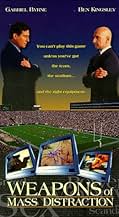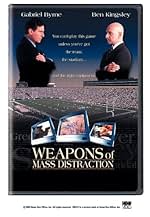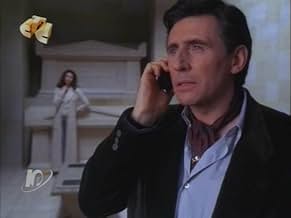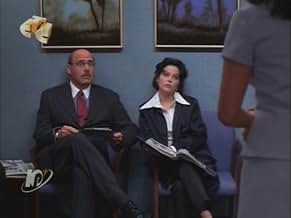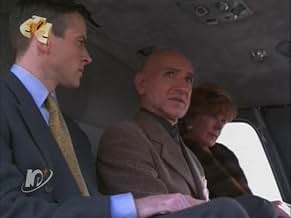Ajouter une intrigue dans votre langueTwo media moguls get into a nasty power struggle for the ownership of a pro football team, which causes drastic effects on their personal and professional lives.Two media moguls get into a nasty power struggle for the ownership of a pro football team, which causes drastic effects on their personal and professional lives.Two media moguls get into a nasty power struggle for the ownership of a pro football team, which causes drastic effects on their personal and professional lives.
- Nommé pour 4 Primetime Emmys
- 1 victoire et 9 nominations au total
Histoire
Le saviez-vous
- AnecdotesElea Oberon's debut.
- Citations
Lionel Powers: Apparently his rotten spying bastards are better than my rotten spying bastards!
- ConnexionsFeatured in The 49th Annual Primetime Emmy Awards (1997)
- Bandes originalesA - You're Adorable
Written by Buddy Kaye, Fred Wise and Sidney Lippman
Courtesy of Aria Music Co. and Budd Music Corp.
Commentaire à la une
Weapons of Mass Destraction is about men without souls or, if they had souls, they lost them along the way while on their quest for more wealth and power. Corporate titans Lionel Powers (Gabriel Byrne) and Julian Messenger (Ben Kingsley) are fighting over a pro-football team, but the object of their struggle is irrelevant. What is relevant are the despicable things they are willing to do to each other to get want what they want.
Of course, one of the reasons why they can engage in blackmail and smear campaigns has a lot to do with the fact that there are very few characters in the film who have any morality. I won't spoil the twists and turns. Suffice to say, the powers that be engage in extra-marital affairs, rape, child molestation, murder, blackmail and bribery. The screenwriters were even able to introduce the holocaust at one point. It is hard to sympathize with people like that, even when they suffer. This is largely because this film is about horrible people, but also because the characters themselves are reduced -- ironically because of their great success in the corporate world -- to beasts with impulses. Lionel's relations with his wife are characterized almost solely by lust, rather than any true affection. Only Jerry Pascoe (Chris Mulkey), the hapless worker who was recently laid off, possesses any humanity, though his morality falls by the wayside by the end of the film.
Yet in spite of the emptiness of the main characters or maybe because of it, I had a perverse fascination with Powers and Messenger's struggle as it unfolded. Part of it was my interest in watching naked ambition and sheer determination on screen. At one point, Messenger told Powers I survived Adolf Hitler and therefore I could survive you. Lionel responded, "I will try not to disappoint you." As it turned out, Messenger had it better under the Fuhrer.
The other main character in this film is, of course, the media. The media is probably even more despicable than the characters, which says a lot. It focuses almost exclusively on sex scandals, car chases, petty murders and like, and ignores anything with substance, meaning or sophistication. Perhaps, Lionel Powers and Julian Messenger are, in some respects, parodies of the media and advertising.
So what do I think of the film? It is not a great film. Unlike Visconti's "The Damned," which is also about moral decay, "Weapons of Mass Distractions" lacks the sophistication that would make its characters fascinating, which is the only way to compensate for our lack of sympathy with them. In fact, stupidity, selfishness and base impulses -- the qualities that are more common in children -- are the only things driving this film, which is really not enough. It is not an optimistic picture, because we are witnessing people living in hell on earth, which makes the church that Powers visits with his wife rather ironic. But it's still an interesting film in a perverse sort of way. It makes fun of sensationalism, but it also uses it to great effect to keep people watching. In many ways, "Weapons of Mass Destruction" reminds me of the fascination one gets looking at the sensational (and false) stories on the front cover of the national inquirer or the Globe. Perhaps in the end, the film is not about Powers and Messenger, but about ourselves. It tells us something about ourselves.
Of course, one of the reasons why they can engage in blackmail and smear campaigns has a lot to do with the fact that there are very few characters in the film who have any morality. I won't spoil the twists and turns. Suffice to say, the powers that be engage in extra-marital affairs, rape, child molestation, murder, blackmail and bribery. The screenwriters were even able to introduce the holocaust at one point. It is hard to sympathize with people like that, even when they suffer. This is largely because this film is about horrible people, but also because the characters themselves are reduced -- ironically because of their great success in the corporate world -- to beasts with impulses. Lionel's relations with his wife are characterized almost solely by lust, rather than any true affection. Only Jerry Pascoe (Chris Mulkey), the hapless worker who was recently laid off, possesses any humanity, though his morality falls by the wayside by the end of the film.
Yet in spite of the emptiness of the main characters or maybe because of it, I had a perverse fascination with Powers and Messenger's struggle as it unfolded. Part of it was my interest in watching naked ambition and sheer determination on screen. At one point, Messenger told Powers I survived Adolf Hitler and therefore I could survive you. Lionel responded, "I will try not to disappoint you." As it turned out, Messenger had it better under the Fuhrer.
The other main character in this film is, of course, the media. The media is probably even more despicable than the characters, which says a lot. It focuses almost exclusively on sex scandals, car chases, petty murders and like, and ignores anything with substance, meaning or sophistication. Perhaps, Lionel Powers and Julian Messenger are, in some respects, parodies of the media and advertising.
So what do I think of the film? It is not a great film. Unlike Visconti's "The Damned," which is also about moral decay, "Weapons of Mass Distractions" lacks the sophistication that would make its characters fascinating, which is the only way to compensate for our lack of sympathy with them. In fact, stupidity, selfishness and base impulses -- the qualities that are more common in children -- are the only things driving this film, which is really not enough. It is not an optimistic picture, because we are witnessing people living in hell on earth, which makes the church that Powers visits with his wife rather ironic. But it's still an interesting film in a perverse sort of way. It makes fun of sensationalism, but it also uses it to great effect to keep people watching. In many ways, "Weapons of Mass Destruction" reminds me of the fascination one gets looking at the sensational (and false) stories on the front cover of the national inquirer or the Globe. Perhaps in the end, the film is not about Powers and Messenger, but about ourselves. It tells us something about ourselves.
- jonathanruano
- 11 août 2009
- Permalien
Meilleurs choix
Connectez-vous pour évaluer et suivre la liste de favoris afin de recevoir des recommandations personnalisées
Détails
Contribuer à cette page
Suggérer une modification ou ajouter du contenu manquant

Lacune principale
By what name was Weapons of Mass Distraction (1997) officially released in Canada in English?
Répondre
